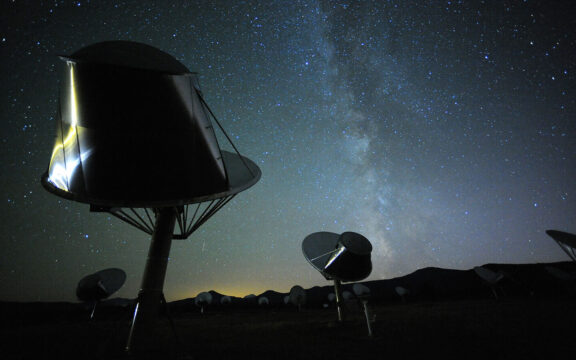The Fermi Paradox: Where are all the aliens?

Written by
Kate Howells
Public Education Specialist, The Planetary Society
May 8, 2025
You arrive at a party. There’s music playing, and great mood lighting. Bowls of chips and dip adorn the tables, and the fridge is full of drinks. Everything you need for a great party is in place, but so far, you’re the only guest.
You sit on the couch and eat a pretzel. You tap your foot to the music, patiently waiting for others to arrive. You peer out the window, but don’t see anyone. You post on social media, “I’m at the party!” But still nobody comes. The hour grows late. Surely if anyone were coming, they’d be here by now.
So, where is everybody?
This is — in a very imperfect way — an analogy of the Fermi Paradox.
What is the Fermi Paradox?
In 1950, Italian-American physicist Enrico Fermi, PhD, was chatting with some physicist coworkers about intelligent alien life, and supposedly asked, “Where is everybody?”

Fermi wasn’t the first to ask such a question, and he didn’t dedicate his life to trying to answer it. But he was a very famous and respected person (known as the creator of the world’s first artificial nuclear reactor), so the question has been forever attributed to him.
The Fermi Paradox is the general observation that the conditions for intelligent life to arise don't seem uncommon in the Cosmos, but we don't observe anybody out there.
You can work through a chain of reasoning (similar to the ideas behind the Drake Equation) to see why it seems like intelligent aliens should be out there:
- There are hundreds of billions of stars in the Milky Way galaxy, and many of those are similar to the Sun.
- Some of these stars have Earth-like planets in their habitable zones, or other kinds of planets and moons where conditions could be favorable to life.
- Many of these worlds have likely hosted habitable conditions for as long as Earth has, if not billions of years longer. So unless Earth is special, many of these other worlds would likely have developed life by now, too. It would be truly, mind-bogglingly extraordinary if Earth were the only planet in the galaxy to have done so.
- Likewise, some of these planets should have developed intelligent, technologically advanced life. Again, if Earth can do it, why can’t they?
- Many of these stars and their planets are billions of years older than ours, so it would make sense for some of these advanced civilizations to be billions of years older — and more technologically experienced — than us. They would likely be capable of interstellar travel, or at the very least, communication.
All of this leads to the conclusion that, in theory, detectable alien civilizations should be common in our galaxy.
And yet, we seem to be the only ones at the party.
It stands to reason that the Universe should be buzzing with activity, but we’ve been searching for signals for decades and haven’t heard zip. This absence of signals, spacecraft, or any other signs of alien intelligence is sometimes called the “Great Silence.”

Are we incapable of detecting aliens?
You might be thinking, “Well, maybe the aliens are all just too far away.” Fair point.
Our own planet’s signals have probably only reached about 100 light-years into space. We’ve only been broadcasting electromagnetic communications for about that long, and nothing can travel faster than lightspeed, hence the limited distance.
But we can detect signals, too. If there were some ancient alien civilization that had been broadcasting for thousands, millions, or even billions of years, those signals would have been able to travel pretty far. But signal strength tends to diminish with distance, so if those alien broadcasters were far enough away, we still might not be able to detect their communications.
Another possibility is that we’re not picking up what the aliens are sending out because we're listening wrong. Maybe we’re tuned into the wrong frequencies. Maybe alien tech uses communication methods we don’t understand or can’t harness yet, like quantum entanglement.
Are aliens avoiding us?
It’s possible that advanced alien civilizations are out there, within communication distance, and maybe even know we’re here, but are choosing not to be found.
One version of this is called the zoo hypothesis, and it’s pretty much what you’d expect from the name: Earth is like a wildlife preserve, and aliens are watching how things play out. Think Star Trek’s Prime Directive — they don’t want to interfere with the natural development of civilizations less advanced than their own.
Like in the world of Star Trek, the zoo hypothesis assumes that there is some kind of agreement between alien civilizations that keeps them all from breaking the no-contact-with-the-humans rule. This could be some kind of peaceful consensus, or the domination of one ruling civilization over the others.
Another take on the general idea of aliens keeping hidden is the dark forest theory. If you’ve read Liu Cixin’s sci-fi trilogy “The Three-Body Problem,” you’ll be familiar with it.
This bleak theory says that the Universe is like a dark forest, and many civilizations act like silent hunters. If you reveal your location, you risk being destroyed. The civilizations that have survived are the ones that understand that the best strategy is to stay quiet, hide, and eliminate any threats.
If this is indeed how the Universe works, that does not bode well.

Are aliens all already dead?
While we’re on bleak street, let’s address the most depressing possibility. Maybe civilizations tend to self-destruct once they reach a certain level of technology.
Nuclear war, climate change, even AI gone rogue — these are all scary possibilities humans have considered might lead to the end of our species.
It’s possible that the traits that drive a civilization to develop advanced technology also contain the seeds of its downfall.
What if we’re all alone here?
There are lots of other hypotheses out there that try to solve the Fermi Paradox. There’s the hopeful idea that we’re just the first ones to get to this point of development. There’s the fun, far-out idea that advanced aliens prefer to expand in virtual reality rather than colonize other planets. And there are lots more ideas in between.
The loneliest explanation is that maybe this really is just a party for one. Maybe we’re the only planet in the entire galaxy where intelligent life developed.
Arthur C. Clarke, a heavy-hitter of science fiction, is famously quoted as saying: “Two possibilities exist: either we are alone in the Universe or we are not. Both are equally terrifying.”
I, for one, think the idea of being the only ones out there is the scariest of all.
But, thankfully, it’s also almost impossible to prove the non-existence of something that could be so difficult to find. The only definitive answer we can ever get to the question of whether other life exists out there is “yes.” Until we get that confirmation of alien life, the possibility will always remain that we just haven’t found it yet.
It’s up to us to keep searching.
Action Center
Whether it's advocating, teaching, inspiring, or learning, you can do something for space, right now. Let's get to work.
Support our core enterprises
Your gift today will go far to help us close out the year strong and keep up our momentum in 2026.
Donate

 Explore Worlds
Explore Worlds Find Life
Find Life Defend Earth
Defend Earth


